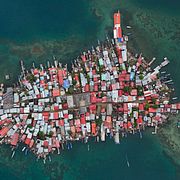
Studie: Marina värmeböljor pågår längre och blir värre
Klimatförändringarna har gjort att marina värmeböljor pågår tre gånger så länge som tidigare, rapporterar The Guardian baserat på en ny studie. Enligt forskare på Mediterranean Institute for Advanced Studies på spanska Mallorca är hälften av de marina värmeböljorna som inträffat sedan millennieskiftet en effekt av den globala uppvärmningen.
Värmeböljorna kommer allt oftare och blir även allt värre. De stör ekosystemen i havet och ger mer energi till stormar vid kusterna, säger Marta Marcos, en av rapportförfattarna. Hon säger att det finns ett mycket tydligt samband mellan värmeböljorna och förbränningen av fossila bränslen, och att lösningen är att den upphör.
– Om man slutar värma upp atmosfären slutar man värma upp haven.
bakgrund
Marin värmebölja
Wikipedia (en)
A marine heatwave is a period of abnormally high sea surface temperatures compared to the typical temperatures in the past for a particular season and region. Marine heatwaves are caused by a variety of drivers. These include shorter term weather events such as fronts, intraseasonal events (30 to 90 days) , annual, and decadal (10-year) modes like El Niño events, and human-caused climate change. Marine heatwaves affect ecosystems in the oceans. For example, marine heatwaves can lead to severe biodiversity changes such as coral bleaching, sea star wasting disease, harmful algal blooms, and mass mortality of benthic communities. Unlike heatwaves on land, marine heatwaves can extend over vast areas, persist for weeks to months or even years, and occur at subsurface levels.
Major marine heatwaves have occurred for example in the Great Barrier Reef in 2002, in the Mediterranean Sea in 2003, in the Northwest Atlantic in 2012, and in the Northeast Pacific during 2013–2016. These events have had drastic and long-term impacts on the oceanographic and biological conditions in those areas.
Scientists predict that the frequency, duration, scale (or area) and intensity of marine heatwaves will continue to increase.: 1227 This is because sea surface temperatures will continue to increase with global warming. The IPCC Sixth Assessment Report in 2022 has summarized research findings to date and stated that "marine heatwaves are more frequent [...], more intense and longer [...] since the 1980s, and since at least 2006 very likely attributable to anthropogenic climate change".: 381 This confirms earlier findings in a report by the IPCC in 2019 which had found that "marine heatwaves [...] have doubled in frequency and have become longer lasting, more intense and more extensive (very likely).".: 67 The extent of ocean warming depends on greenhouse gas emission scenarios, and thus humans' climate change mitigation efforts. Scientists predict that marine heatwaves will become "four times more frequent in 2081–2100 compared to 1995–2014" under the lower greenhouse gas emissions scenario, or eight times more frequent under the higher emissions scenario.: 1214
Omni är politiskt obundna och oberoende. Vi strävar efter att ge fler perspektiv på nyheterna. Har du frågor eller synpunkter kring vår rapportering? Kontakta redaktionen



